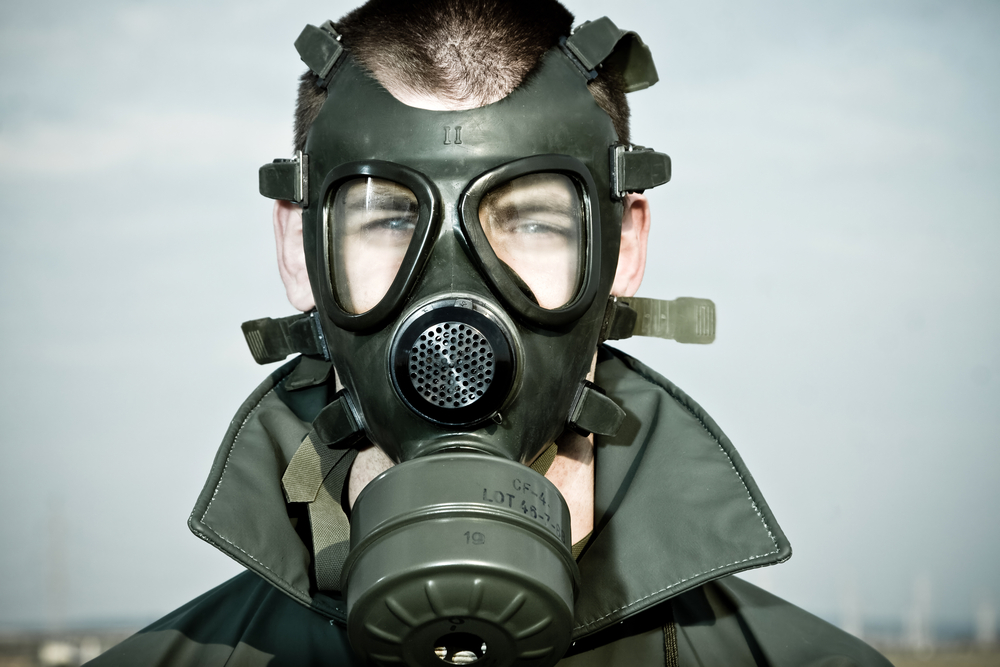Syria: Dangerous Game of Brinksmanship
In addition to occupying Lebanon in violation of UN Resolution 520 (September 17, 1982), paying $1.1B a year in oil revenues directly to Baghdad in violation of the UN Oil-for-Food Plan, using its rail and trucking system to provide Iraq with Eastern European conventional arms and materials for weapons of mass destruction, and using returning Iraqi humanitarian relief planes (originally bound for Syria) to provide Iraq with sensitive “flow-forming machines†used to produce components for uranium-enrichment systems (forming a key element in the production of nuclear weapons), Syria is playing a dangerous game of brinksmanship with Israel.
As a rule, nations that play this “game” understand the limits beyond which actions lead to war. But the “new prince” in Damascus apparently does not understand the limits of Israeli tolerance, and Israeli patience is wearing thin.
–break–
“A weak Syria, with a neophyte President, is an accelerator for Hezbollah and a threat to regional stability.” That was the message that American leaders recently conveyed to the foreign ministers of the European Union. “Watch Hezbollah”, they warned. “They will provoke a regional conflagration with Israel unless Syria intervenesâ€.
The problem reduces itself to two elements.
First, Hezbollah operates virtually uncontrolled in southern Lebanon despite the presence of 25,000 Syrian troops in the area. And each day, it escalates its hostility on Israel’s northern border.
Second, Hezbollah’s leader, Secretary-General Sheikh Sayed Hassan Nasrallah has enormous influence over the naive new Syria President Bashar al-Assad (son of the late Syrian President Hafez al-Assad) who seems unaware of the fact that he is courting disaster by supporting a terrorist organization that is bent Israel’s destruction.
Hezbollah has deep ties to Hamas, al Qa’eda and the smaller Palestinian Islamic Jihad, and is actively providing terror training and arms to al Qa’eda and both Palestinian fundamentalist movements. This kind of cooperation is hardly a thing of the past: all four organizations are reported to have met in Lebanon in March of 2002 to coordinate strategy against the U.S.
Despite holding only twelve seats on Lebanon’s 128-seat parliament, Hezbollah — supported by Iran and sustained by Syria — maintains a powerful voice in Lebanese politics and virtually free reign throughout the country. And since the summer of 2000, Hezbollah’s reputation has grown to near-mythic proportions among supporters. It is now the model of emulation for Palestinian radicals, based on the perception that the group was the driving force behind Israel’s precipitous, and ill-advised, withdrawal from southern Lebanon in May of that year. Regular calls about the need to “Lebanonize” the Palestinian terrorist war with Israel now emanate from the West Bank and Gaza, proof positive of Hezbollah’s widening appeal.
The movement’s holy warriors have wasted no time in capitalizing on their newfound notoriety. In an interview this March with London’s Sunday Times, Sheikh Hassan Nasrallah, Hezbollah’s General Secretary, revealed plans to redraw the military equation between Israel and the Palestinians by supplying groups like Hamas and Islamic Jihad with short-range Katyusha rockets. The organization is even said to be working to develop weapons of mass destruction. The group is reportedly accumulating chemical weapon components at two facilities in Lebanon, with the ultimate goal of placing them on short-range ballistic missiles acquired from Iran.
In all this, Bashar al-Assad remains silent. Contrary to his late father, Hafez al-Assad, President Bashar al-Assad has imposed very few restrictions on his terrorist proteges. He has ignored warnings from both Israel and the United States to stop aiding terrorists although President Bush left Syria off his “Axis of Evil†list after 9/11.
Bashar al-Assad, who studied opthalmology in Britain until 2 years ago when he assumed power in Syria after his father’s death, is a novice who lacks the machiavellian middle eastern caution of his late father.
Although he took power promising to reform the Syrian economy (thus making it more attractive to foreign investors), he has become hostage to the conservative camp in Damascus – party functionaries, senior army officers, even younger members of the establishment – and has done nothing in the area of reform or even attempted to rein in the terrorist organizations in his midst.
Assad Sr.’s hatred of Islamic militants was well established. Without hesitation, he ruthlessly crushed the Islamic rebellion in Hama, Northern Syria where, for 27 days, the Syrian army besieged the city, bombarded it with heavy artillery and tank fire, invaded it, and slaughtered between 30,000 and 40,000 men, women and children in the process. After the carnage was completed, Hama was bulldozed out of existence and paved over as a permanent national monument to the futility of rebellion against the Assad regime. Such was Hafez al-Assad’s policy in dealing with radical Islamic fundamentalism.
Bashar al-Assad, however, sees Hezbollah as a strategic partner and as a front-line operational arm in the war on Israel. In fact, al-Assad enjoys a special, almost spiritual relationship with Nasrallah, and there is a deep convergence of anti-Israel hatred between the two.
Thus, rather than crush Hezbollah, Syria now encourages the Islamic fundamentalist organization to continue its terrorist attacks against Israel by focusing its attention on the Shebaa Farms area of Lebanon and providing it with money and rockets.
It also prevents the Lebanese Army from deploying its forces in Southern Lebanon as a counterforce to Hezbollah. In contradistinction to the policies of the previous regime, al-Assad enables Iran to provide extensive military assistance to Hezbollah through Lebanese territory, provides facilities for its headquarters in Damascus (as well as 9 other terrorist organizations), and enables the organization to establish an intensive training infrastructure in Syria.
In so doing, President al-Assad is assisting Hezbollah in consolidating its power even to the extent of allowing Syrian territory to be used as a transit point for Hezbollah terrorists heading to Southern Lebanon.
American and Israeli leadership both share a common concern that Bashar al-Assad is “playing with fire”. Hezbollah has the ability – even the intention – of sparking an explosion that could lead to a regional war. Nasrallah now possesses 7,000 Katyusha rockets – each targeted at Israel. Some are heavy, long-range missiles that threaten the entire Galilee region to the outskirts of Haifa (and its oil refineries).
Hezbollah has completed building a line of forward positions along the Israeli border, complete with video cameras that track the IDF’s movements in order to learn the operational routine of its units. Iranian officers in Southern Lebanon check Hezbollah deployments directly under Syrian eyes.
Within the next several months, Hezbollah will also complete construction of its second line of defense deep inside South Lebanon meant to create a barrier against any Israeli armed advance. The effect of such a barrier will permit Hezbollah to shell northern Israel continuously over a period of several months, and, if necessary, to slow an Israeli retaliatory invasion.
The problem for Israel is that young President al-Assad has surrounded himself with people inexperienced in high politics, although he recognizes his country’s military and technological inferiority to Israel. Assad Jr. unfortunately, is fascinated by Nasrallah, accepts his patronizing praise and has allowed him to hold at least one Hezbollah paramilitary parade on Syrian soil.
He’s playing the dangerous game of brinksmanship without understanding the rules. Slowly, almost invisibly, an important revolution appears to be underway. Hezbollah is gradually consolidating its strength in Syria, and the Iranians, whose Vice-President recently visited Damascus, have “laid down the law” for the confused leadership there.
A Syria that can be manipulated by Hezbollah under Iranian guidance could well miss that crucial moment when Iran and Hezbollah attempt to spark a regional conflagration by means of a military provocation on Israel’s northeastern border.
That is a major source of concern to both Israel and the United States Defense Department. A weak and naive Syria will accelerate the power, influence and growth of Hezbollah, just as Arafat now finds it impossible to control Hamas, Islamic Jihad, Tanzim and the al Aksa Martyrs Brigades in the Palestinian territories. The more that Nasrallah is convinced that Assad Jr. is not up to speed; the more he will be convinced that he, in consultation with his Iranian cohorts, holds the key to power. And if he is convinced that there is an American threat to Iran, he will preempt it by striking at the Galilee to provoke an Israeli retaliatory strike.
But that retaliatory strike will be at Hezbollah in Lebanon as well as Syria.
This is not an imaginary scenario. As recently as three weeks ago, American and Israeli UN representatives met privately with their Syrian counterpart to warn him of the danger posed to Syria and the entire region by Hezbollah.
The singular conclusion is that someone has to inject sufficient fear into the Syrians to bring Nasrallah down.
And if the Europeans and Americans can’t, the Israelis will.


